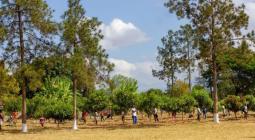Dutch Caribbean islanders sue Netherlands over climate change
Bonaire citizens file formal legal challenge, as research shows part of island will be submerged by 2025
Eight people from the Caribbean island of Bonaire are suing the Netherlands, accusing it of violating their human rights by not doing enough to protect them from the climate crisis.
The group, with Greenpeace Netherlands, filed a formal legal challenge against the Dutch government in The Hague on Thursday, asking the district court to order it to cut its greenhouse emissions much more quickly and to help its most vulnerable territories adapt to the impact of the climate crisis.
Located nearly 8,000km (about 5,000 miles) from the capital of the Netherlands, Bonaire has been a Dutch special municipality since 2010. But the Netherlands has been present on the island for about 400 years, and in 2022, the government apologised for enslaving its people.
As a low-lying island, Bonaire is likely to experience serious consequences from climate change, including extreme weather and sea-level rise.
An October report from the Dutch meteorological institute (KNMI) found that temperatures in the Caribbean Netherlands had already increased by about 0.2C every decade since the 1980s. Rainfall is declining, particularly in the dry season. Experts expect this to worsen if greenhouse gas emissions continue to rise.
Onnie Emerenciana, a farmer living on Bonaire and one of the plaintiffs, said it was already becoming increasingly difficult to grow crops because of the growing heat, wind and unpredictable rain. “It’s becoming very, very, very hard to plant.”
The KNMI report concludes that climate policy that focuses on reducing emissions can make a big difference to the future of Dutch Caribbean islands such as Bonaire.
Research by the Vrije Universiteit Amsterdam, commissioned by Greenpeace, shows sea-level rise is likely to permanently submerge parts of the island by 2050, a problem exacerbated by the loss of coral reefs as a natural buffer against the oceans warming and acidifying.
The studies also concluded that the climate crisis would exacerbate health problems on the island and could ruin its cultural heritage and tourism industry. Bonaire is a popular diving destination, and the degradation of coral reefs could lead to the loss of the majority of dive sites, which it is estimated will reduce visitor numbers by more than 100,000.
The group of islanders, most of whom still live on Bonaire and are Dutch citizens, want the Netherlands to tighten its climate goals, so it contributes its “fair share” to keep global heating below 1.5C above preindustrial levels, which would involve reaching net zero greenhouse gas emissions by 2040 – 10 years earlier than its current target.
They also want solid plans, developed with the islands’ inhabitants, to protect Bonaire from the consequences of the climate emergeency, to ensure that islanders can continue to live there, and pass on their traditions and culture to their children.
Not doing this, they argue, is a breach of their human rights, particularly their right to life, and respect for private and family life.
Eefje de Kroon, the climate justice expert at Greenpeace Netherlands who is working on the case, noted that the Netherlands is known for its advanced water-management strategies on the mainland, but the government has done very little to study how the climate crisis will affect its Caribbean outposts and how they could be protected. The national adaptation strategy excludes the islands completely.
The group sent a pre-litigation “letter before action” to the Dutch government last May, hoping to resolve the issue without going to court.
In an official response in October, the Dutch finance secretary, Alexandra Carla van Huffelen, said the state shared the islanders’ concerns but maintained that the country’s existing climate targets were appropriate, noting that they were tightened last summer.
On adaptation, van Huffelen said a substantial amount of research had already taken place but would benefit from a clear overview that was more accessible to the public. She said a climate plan would be developed for each of the Caribbean Netherlands BES islands this year, informed by a “climate table” led by islanders as recommended by an advisory report. It has allocated €1m (about £861,000) to this project.
The plaintiffs have held discussions with ministers but were not satisfied, saying the government had failed to make any concrete changes.
Social worker Danique Martis said the Caribbean Netherlands have been forgotten for too long. “It saddens me to see how, despite knowing their responsibility, the Dutch government has chosen to push our right to safety aside. For this reason, we are going to the court, so they have no choice but to act.”
De Kroon said the threat of the lawsuit had already begun to change the government’s approach and raised the profile of the issue. As well as helping Bonaire, she hopes that a positive ruling would benefit those living on other Dutch Caribbean islands.
The lawsuit is the latest in a wave of climate litigation in the Netherlands and around the world. In 2019, the Dutch government lost the landmark Urgenda case when the country’s supreme court found it had explicit duties to protect its citizens’ human rights in the face of the climate emergency and was required to undertake at least its fair share in cutting global emissions.
This latest case seeks to build on that ruling and show that the country has legal responsibilities to all of its territories. Like other climate lawsuits, such as that brought by Torres Strait islanders (also known as the Zenadth Kes) against Australia, it highlights the particular vulnerability of island communities.
Cover photo: Residents of Bonaire, together with Greenpeace Netherlands and allies, stand up for climate justice. Photograph: Roëlton Thodé/Greenpeace





